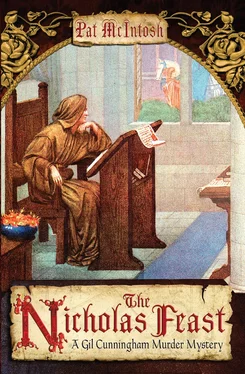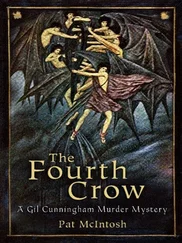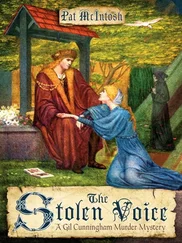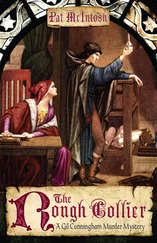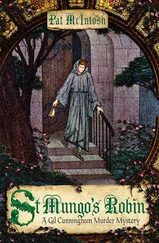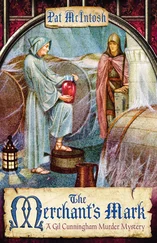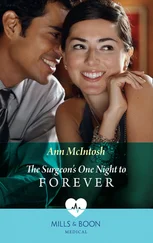Pat McIntosh - The Nicholas Feast
Здесь есть возможность читать онлайн «Pat McIntosh - The Nicholas Feast» весь текст электронной книги совершенно бесплатно (целиком полную версию без сокращений). В некоторых случаях можно слушать аудио, скачать через торрент в формате fb2 и присутствует краткое содержание. Жанр: Исторический детектив, на английском языке. Описание произведения, (предисловие) а так же отзывы посетителей доступны на портале библиотеки ЛибКат.
- Название:The Nicholas Feast
- Автор:
- Жанр:
- Год:неизвестен
- ISBN:нет данных
- Рейтинг книги:4 / 5. Голосов: 1
-
Избранное:Добавить в избранное
- Отзывы:
-
Ваша оценка:
- 80
- 1
- 2
- 3
- 4
- 5
The Nicholas Feast: краткое содержание, описание и аннотация
Предлагаем к чтению аннотацию, описание, краткое содержание или предисловие (зависит от того, что написал сам автор книги «The Nicholas Feast»). Если вы не нашли необходимую информацию о книге — напишите в комментариях, мы постараемся отыскать её.
The Nicholas Feast — читать онлайн бесплатно полную книгу (весь текст) целиком
Ниже представлен текст книги, разбитый по страницам. Система сохранения места последней прочитанной страницы, позволяет с удобством читать онлайн бесплатно книгу «The Nicholas Feast», без необходимости каждый раз заново искать на чём Вы остановились. Поставьте закладку, и сможете в любой момент перейти на страницу, на которой закончили чтение.
Интервал:
Закладка:
‘Some papers only,’ said Gil.
‘Nothing important, I hope?’
‘Nothing that cannot be replaced.’
‘Did you know them? Were they common blackguards of the burgh, or someone’s dagger-men? What could their motive have been?’
‘I never got a sight of their faces,’ said Gil.
‘They seemed expert fighters,’ remarked Maistre Pierre. ‘And used to working together, I thought, Gilbert.’
‘Aha!’ said the chaplain. ‘Maister Doby will hear that with relief, and I admit to the same.’
Maistre Pierre looked startled, but Gil said, ‘No, it was none of your flock, father. These were all older than I am, by their movements, and seasoned fighters as Maister Mason says. As to motive, I have no clear idea, but since the papers they took were connected to the matter I am investigating for the college, I assume it was related to that.’
‘Ah, yes. Poor William. Requiescat in pace.’ Father Bernard made the sign of the cross, and Gil and the mason both murmured Amen. After a moment he continued, ‘His burial will be tomorrow, after Sext, and we have arranged a quodlibet disputation in Theology after dinner, to give the boys’ minds a better direction and prevent them falling into melancholy.’
So we have until noon tomorrow, Gil thought, to bring this to a conclusion.
‘Did you know the dead boy well, father?’
‘Why, no, hardly more than his fellows.’
‘There are only forty students just now,’ Gil pursued, ‘few enough to spend the whole year with. Did nothing distinguish William Irvine from the others?’
‘I could not say so. I had little contact with him, except for the music. I know the students of Theology well, of course,’ expanded Father Bernard, ‘mature individuals with well-formed minds, but the young men of the Faculty of Arts come less in my way, other than those who confess to me.’
Gil thought of some Theology students he had known, but did not comment. Instead he said, ‘Who was William’s confessor?’
‘I think perhaps Dean Elphinstone.’
‘Do you know who his parents were?’ asked the mason.
The dark eyes turned to him. ‘I can tell you nothing about his parentage.’
‘Or about his habits of extortion?’ Gil asked.
‘Extortion? Did he — It seems hard that he should be dead in such a way, poor boy, and slandered as well. I am sure he did not practise extortion. Have you discovered nothing that might tell us who killed him?’
‘So he never approached you with threats of any kind?’ Gil asked.
‘Certainly not! What could he threaten me with?’
‘None of us is blameless,’ pronounced the mason.
‘That is very true,’ agreed Father Bernard, attempting to regain control of the conversation, ‘but I hope my faults are not such that a boy of sixteen could frighten me with threats of exposure.’
‘What did he have to show you, father, yesterday in the Outer Close before the procession?’ Gil asked.
‘Yesterday? He showed me nothing,’ began Father Bernard.
‘I brought him a package from his foster-mother,’ Gil said. ‘I gave it to him before the college yett, and went into the close. William passed me, and spoke to you in the courtyard. I thought he said This might interest you , or some such thing. I wondered if it had anything to do with the package.’
‘Oh, now I recall.’ Father Bernard’s sunken eyes turned piously to the ceiling. ‘The poor boy. He wished to show me something, and I had not time to hear him, for I still had to arrange for the music to be carried to St Thomas’s. I promised to give him time later, perhaps after I had given the ordinary Theology lecture, but of course by then he was dead. The poor boy,’ he said again. ‘I suppose we may never know what troubled him.’
‘He is salved of all troubles now,’ Maistre Pierre pointed out. He and Father Bernard crossed themselves simultaneously.
‘And he had never threatened, for instance,’ said Gil almost at a venture, ‘to report you to the Vicar-General of your Order for heresy?’
‘For heresy?’ repeated Father Bernard harshly. ‘Why should he do that?’
‘For quoting Wycliff, perhaps,’ Gil suggested, ‘or discussing Lollardy in your ordinary lectures?’
‘One must encourage students to dispute these points, so that one may expose the fallacies on which they are grounded,’ retorted Father Bernard in Latin.
‘That alone might create trouble if one were in Paris,’ Gil observed.
The theologian snorted. ‘Paris! They’re still licking at Louis’ heels on the nominalist question. They can’t have it both ways.’
‘While Glasgow follows Albert, the subtil clerk and wys . The path of orthodoxy is narrow,’ said Gil, watching the friar carefully, ‘and William was industrious in detecting those who stepped from it in other segments of the University sphere. I speculated, merely, on whether he had approached you in the same way.’
‘No,’ said Father Bernard. Gil waited, while the mason looked from one to the other. ‘But I had wondered,’ said Father Bernard after a moment, reverting to French.
Gil, still waiting, was aware in the corner of his eye of movement in the courtyard. There was a knocking at the house door. Father Bernard’s expression grew troubled and portentous.
‘I thought the boy might have been gathering information,’ he admitted.
‘We know he was doing that,’ Gil agreed. Down in the courtyard Alys in her blue gown hurried out to the pend beside a groom in well-worn riding-gear. ‘Any sort of information in particular?’
‘Information to sell,’ pronounced Father Bernard. The musical voice took on a note of grief. ‘Information of value to one faction or another, the selling of which could only increase the discord with which this poor country is riven.’
‘Espionage?’ said Maistre Pierre. ‘It seems very possible. But who would he sell to, here in Glasgow?’
Gil turned his gaze away, in time to see Alys crossing the courtyard again, leading a guest in to the door in the most formal way. The hand laid on her arm belonged to a slender, graceful woman in muddy travelling-garments, her hair bound up in a coarse black cloth under a battered felt hat like a sugar-loaf with a brim.
Has she not given that hat to the poor yet? he thought in resignation, and looked back at the Dominican, who had closed his mouth over his yellow teeth with the air of one having summed up a situation.
‘Are you saying, father,’ he said, ‘that William was in truth selling information to someone? Which faction did you have in mind?’
‘I have no way of knowing,’ stated the chaplain. ‘He was kin to Lord Montgomery, which would give him an entry to Argyll and his followers.’ Gil nodded, and wished he had not. ‘And he messed with Michael Douglas, who is below in your kitchen, and his friends last year. He would have contact with the Hamiltons and Douglases through that boy.’
‘I think Michael dislikes him,’ Gil observed.
‘A false face, surely, designed to conceal the truth.’ Father Bernard looked over his shoulder as footsteps sounded in the other room. ‘You have another guest,’ he said, rising.
Alys entered the room first.
‘See who is here, father,’ she said. ‘It is Gil’s mother.’ She stepped aside to allow the woman in the sugar-loaf hat to follow her.
Most landholders, when they travelled, took time near their destination to find a sheltered spot, groom the horses and change their clothing, in order to make a good appearance by riding into burgh or castle in velvet and satin and jewels rather than stained travelling gear. This woman’s heavy woollen skirts were bedraggled and spattered, there was mud on her hat and her long-chinned, narrow face, and the gloves she drew from her hands as she stood in the doorway were dark with her horse’s sweat.
Читать дальшеИнтервал:
Закладка:
Похожие книги на «The Nicholas Feast»
Представляем Вашему вниманию похожие книги на «The Nicholas Feast» списком для выбора. Мы отобрали схожую по названию и смыслу литературу в надежде предоставить читателям больше вариантов отыскать новые, интересные, ещё непрочитанные произведения.
Обсуждение, отзывы о книге «The Nicholas Feast» и просто собственные мнения читателей. Оставьте ваши комментарии, напишите, что Вы думаете о произведении, его смысле или главных героях. Укажите что конкретно понравилось, а что нет, и почему Вы так считаете.
